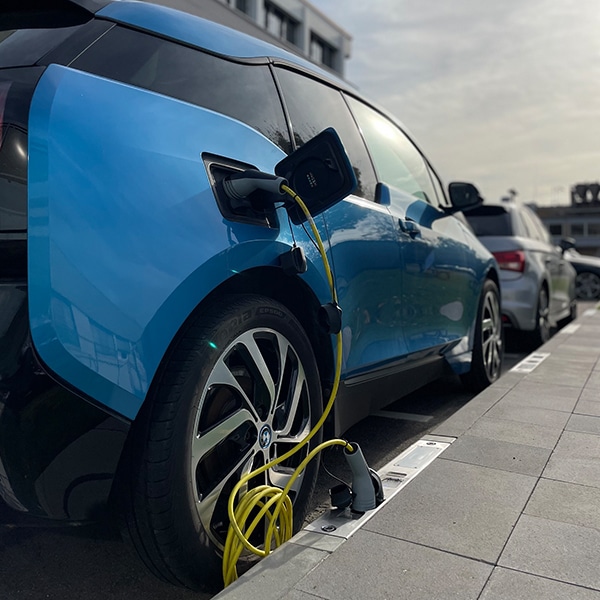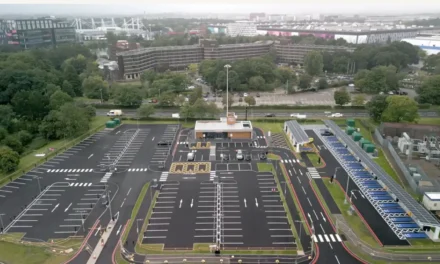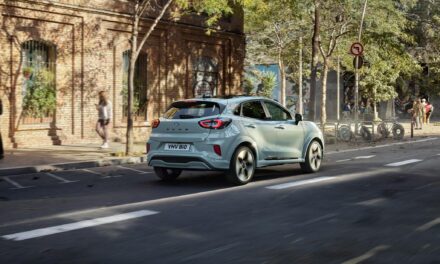Rheinmetall, the City of Cologne and TankE GmbH have embarked on a pilot project to install curb stone charger infrastructure in public streets.
The objective of the project is to integrate and pilot test Rheinmetall curb stone chargers in two different parts of the city to validate their acceptance and their urbanistic and design advantages. The city recently signed a letter of intent to this effect. The pilot project is slated to begin this summer.
Integrating the charger electronics into a curb stone turns it into de facto “charging pole”, though without the associated limitations. “We thank the City of Cologne for its planned support in pilot testing our forward-looking curb stone chargers, which help to overcome a major hurdle in the transformation to greater e-mobility, while blending almost invisibly into the urban landscape”, declared Rheinmetall CEO Armin Papperger. “We particularly appreciate the city’s willingness to implement the project right away, because there’s no time to lose on the road to modern, environmentally sustainable mobility.”
Jörn Hansen, head of corporate development at TankE GmbH, called the pilot project “a further step in the development of innovative e-mobility projects in Cologne”, citing the installation of the first public charging station in 2010, the charging infrastructure for the first fully electric bus line, advances with 2nd life storage technology and inductive charging for taxis. “And now at TankE we’re testing another innovative technology together with Rheinmetall and the City of Cologne that will create an alternative way of charging electric vehicles in public streets that doesn’t interfere with urban aesthetics”, says Hansen.
Advertisement
In coming years, Cologne – Germany’s fourth-largest city – will be facing all the multifaceted challenges of a growing metropolis: climate change and climate protection, mobility, a growing population, economic change and digitalization. As Ascan Egerer, alderman for mobility, states, “As a city, we want to actively shape this change and to develop forward-looking concepts for addressing these challenges at an early stage. This letter of intent is proof of our strong interest in a pilot project for innovative charging infrastructure with project partners Rheinmetall and TankE GmbH.”
Charging infrastructure plays a key role in the epochal transition to electromobility. The German government’s ambitious target of 15 million electric vehicles by 2030 can only be attained if charging capacity keeps pace with the country’s expanding fleet of e-vehicles, since in future many more people who lack access to private parking spaces and charging stations will have to make the switch to e-mobility as well. It is estimated that Germany will need around a million public charging stations by the year 2030.
This imperative bumps up against the lack of space in urban areas for fast, flexibly scalable, low-cost installation of readily accessible public charging stations. Conversely, the solution developed by Rheinmetall makes intelligent use of existing urban infrastructure while simultaneously assuring an identical level of charging performance, effectively transforming curb stones into charging poles. By the same token, this remarkably robust solution can be installed practically anywhere in an urban environment, thus making it scalable, too.
“Based on discussions held thus far, we see a number of unique advantages here compared to existing charging systems, resulting in opportunities for successfully shaping the revolution in mobility”, declares Ascan Egerer.
Because safety is an integral part of Rheinmetall’s DNA, the system was subjected to rigorous testing prior to its first utilization in public space in the forthcoming pilot project. In developing this solution, Rheinmetall is making an important contribution to the success of the mobility revolution, while helping to assure a viable climate for future generations.
TankE GmbH is a subsidiary of RheinEnergie AG. It offers a comprehensive array of services for planning, constructing and operating charging infrastructure. Its market includes industrial and commercial customers, vehicle fleet operators, the real estate sector, as well as local governments and public utilities. The company is therefore familiar with the challenges that municipalities face when installing public charging infrastructure in a manner compatible with urban aesthetics. The expertise of the project partners makes them a perfect match for supporting the City of Cologne as it takes up the technical and urbanist challenge of installing public charging infrastructure.
















